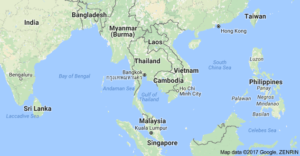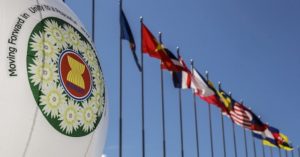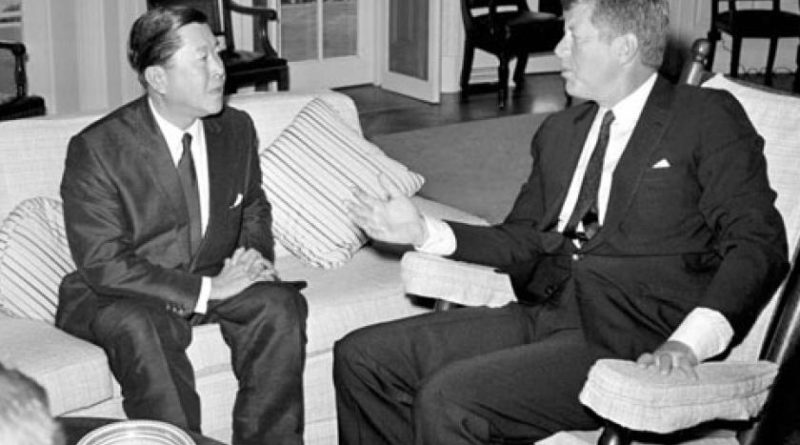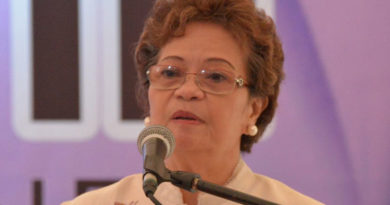Thanat, doyen of ASEAN diplomacy
“We [Thais] cannot forsake our responsibility and leave it to others to shape our destiny for us.
.
So we are not hawkish, we are not anti-communist, we are just plain and simple people who want to live and to survive as free people and a free nation.” This unmistakable articulation of Thai diplomacy made by Thanat Khoman in 1968 is still very much alive and kicking today.
Thailand in an independent country pursing an independent foreign policy. Any description beyond this is an aberration and a misconstruction of the country’s conduct.
Thanat was appointed the country’s foreign minister in 1959 after serving as an ambassador to Washington. It was a time when the Cold War was at its peak. The world’s superpower, the US, decided to escalate the war in Vietnam. Elsewhere in the region, newly decolonised neighbours bordering Thailand were struggling with their new freedom and nation-building. Creating new friends and accommodating former foes were huge challenges at the time. It was this adverse strategic environment that placed Thanat at the centre of the regional scheme of things.
For the next 12 years, until 1971, he would become the country’s longest-serving foreign minister, leaving a long-lasting diplomatic legacy in his country and beyond. After all, he was the diplomat who got together the leaders of Singapore, Malaysia, Indonesia and the Philippines to establish ASEAN in 1967. At that time, no one thought it possible because earlier efforts had failed to put together a regional organisation. After the founding of ASEAN, major powers ridiculed it, concluding it would not survive. However, ASEAN will be 50 years old in two weeks’ time.

ASEAN has come a long way. Prying into the future, the journey ahead will be equally challenging. Therefore, it is about time we remember the versatile diplomat who encompassed the quintessence of Thailand’s ancient art of diplomacy.
Thanat’s former lieutenant, Sompong Sucharitkul, 85, recounted his day-to-day experiences working with his boss during a heady period of engagement with neighbouring countries and the world. Before ASEAN’s founding fathers met on August 5-6 at a seaside resort in Bang Saen, Chon Buri, to discuss the nitty-gritty of the Bangkok Declaration, Thanat travelled to Malaysia, Singapore, Indonesia and the Philippines to consult and garner support from their leaders. Sompong revealed that trust and respect for the Thai foreign minister, as well as close personal ties among key decision makers, smoothed the way for the formation of ASEAN. The seven-point declaration was signed a day later at Saranrom Palace, the former headquarters of Thailand’s Ministry of Foreign Affairs.
As a former secretary-general of ASEAN, Surin Pitsuwan fully understands the strength and weaknesses of the world’s most successful regional organisation. Surin, also a former foreign minister, praised Thanat for his vision and conviction to see small countries, fresh from decolonisation, get together to form a common platform to put forward their views and positions. “Thanat wanted them to speak as one voice to bargain with bigger powers,” he said.
During his tenure, Surin helped to increase the comfort level among ASEAN leaders, encouraging them to exchange views on domestic issues, through so-called “flexible engagement”. In the past, he said, it was taboo even to mention a domestic issue or problem in one of the member countries, but now the leaders can talk about any subject among themselves without being accused of interfering in another country’s affairs.
Amarin Khoman, Thanat’s nephew, who once had the opportunity to follow his uncle on a trip abroad, recalled the experience. He said Thanat was a nationalist who put Thailand’s interests first and foremost. His uncle wanted to use his leadership to increase the bargaining power of Thailand and its neighbours and join the broader international community. In memory of his uncle, Amarin led a team of a dozen editors and researchers in compiling thousands of interviews, speeches and statements from all available materials. The resulting 161-page book, ‘The Wit and Wisdom of the Lead Asean Founder,’ was launched last week. It also contains rare photographs from family albums.
In the final quarter of his career, Thanat was able to put together all his experience, influence and network of friends in neighbouring countries to form ASEAN, one of his biggest achievements. During his tenure, Thailand stood up and led the region toward peace and stability. At the time, the Southeast Asian region was in turmoil. The Vietnam War was raging, other non-communist countries were trying to rebuild. Most importantly, they did not yet trust one another.
One thing that was striking was that Thanat was extremely aware of the role small nations and major powers play in international politics. He referred constantly to small nations, especially during the founding of ASEAN. He said in an interview in February 1967 with The New York Times: “Do not underestimate us. We can move much faster than many people think.” He added that “even in our smallness, let our staunch stand for freedom and liberty shine as a beacon to greater entities.”
Given the ongoing debate over the proper role of small states in the Gulf and ASEAN, Thanat’s wisdom was certainly not found wanting. “We prefer to be with ourselves and to be modest because we are small nations. We cannot afford to extol or to overrate ourselves.” Days after the founding of ASEAN, on September 14, 1967, Thanat said “the nations out here in Southeast Asia are small. And individually, we do not count as much! But if we get together, our strength would be increased”.
Thanat knew ASEAN was young and still had much to learn. When the group was only four years old, he commented: “If those small nations can learn and find ways and means to band together and cooperate with one another, they may eventually be able to shape and implement a positive and concerted policy without being squeezed or crushed by the weight and pressure of larger countries.” This, indeed, was the dawn of regionalism and regional cooperation.
Thanat was also mindful that small nations had their own intrinsic limitations. “We prefer to be among equals and of course, we cannot be equal with the bigger ones.” Reflecting on the role of the US at the height of Cold War and the possibility of an American withdrawal from the region, Thanat was very candid.
He believed the US could not afford to withdraw from the world scene. “And if it were to do so, it will be to the detriment of the position of the US in the world as a world power,” he said in the Times interview in 1968.
I glanced through the 1,620 pages of two giant volumes (weighing four kilograms) of Thanat’s interviews and statements published by the Foreign Ministry in 2014. Three features stood out. First, Thanat was a versatile diplomat who understood the region and major power politics extremely well. He was candid and knew when to be more assertive and when to adopt a lower profile. He was equally comfortable in French and English. For the latter, he was self-taught. He also spoke Spanish.
Secondly, he held strong views on Southeast Asia. He believed in regionalism and regional strength. Thanat stated time and again the importance of Thailand’s geographical location and its independent foreign policy. His comments were genuine, untainted by personal interests or, for that matter, party interests. When he spoke about Thailand’s foreign policy and that of the region, he meant it without any pretense. That was why Thai diplomacy was so distinctive and outstanding, even though it was under military administration.
Finally, it reflected the quality of Thai Foreign Ministry officials at the time, who had to respond to constant outside pressure – especially the Domino Theory that feared whole regions would collapse into communism given one communist neighbour. They had to serve the national interest without following any agenda. This helps explain why Thanat could comment on the region and the world so frequently with such insight.
In his foreword, former permanent secretary Sihasak Phuangketkeow, currently Thai ambassador to France, said Thanat was a leader who possessed finesse, erudition, vision and a firm commitment to protecting the national interest. As an elder statesman of foreign policy, Thanat earned a singular place in Thai history.
Kavi Chongkittavorn is the Editor-in-Chief of The Myanmar Times.
<>


NOTE : All photographs, news, editorials, opinions, information, data, others have been taken from the Internet ..aseanews.net | [email protected] |
For comments, Email to : [email protected] – Contributor









